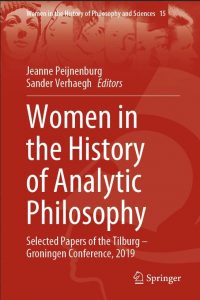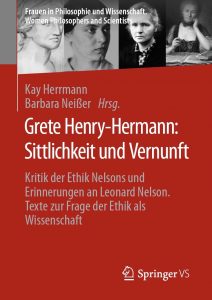Women in the History of Analytic Philosophy - Springer
 The book Women in the History of Analytic Philosophy (2022), edited by Jeanne Peijnenburg and Sander Verhaegh, is part of the Springer series Women in the History of Philosophy and Sciences and presents a collection of papers from the workshop held in October 2019 in Tilburg, Netherlands, dedicated to highlighting the contributions of female philosophers to the development of early analytic philosophy. In the following, we present the two contributions “Anscombe’s Approach to Rational Capacities” by Naomi Kloosterboer and “Grete Hermann, Quantum Mechanics, and the Evolution of Kantian Philosophy” by Michael E. Cuffaro.
The book Women in the History of Analytic Philosophy (2022), edited by Jeanne Peijnenburg and Sander Verhaegh, is part of the Springer series Women in the History of Philosophy and Sciences and presents a collection of papers from the workshop held in October 2019 in Tilburg, Netherlands, dedicated to highlighting the contributions of female philosophers to the development of early analytic philosophy. In the following, we present the two contributions “Anscombe’s Approach to Rational Capacities” by Naomi Kloosterboer and “Grete Hermann, Quantum Mechanics, and the Evolution of Kantian Philosophy” by Michael E. Cuffaro.
Anscombe’s Approach to Rational Capacities
Reigning orthodoxy in the philosophical study of human rational capacities, such as being able to act intentionally and to reason, is to characterize them in causal psychological terms. That is, to analyze these capacities in terms of mental states and their causal relations. It is against this background that the work of G.E.M. Anscombe has gained renewed interest. The main goal of this chapter is twofold. First, I will explicate Anscombe’s philosophical approach by analyzing her account of intentional action and by relating it to the misperceptions of that account in (the history of) the philosophy of action. Importantly, Anscombe holds that an analysis of intentional action in terms of what it is, e.g., an event with certain specific features, cannot provide non-circular explanations. Instead, following Aristotle, Thomas Aquinas and Wittgenstein, Anscombe seeks to explicate intentional action in terms of its form, i.e., the way in which it exists. The second aim of the chapter is to show the import of Anscombe’s approach by applying it to the philosophy of reasoning. After discussing two main problems for the current orthodox view in epistemological debates on reasoning, I will propose an alternative Anscombe-inspired view of reasoning. In this so-called form view of reasoning, reasoning is characterized as a tool to drag out implications, embodied in judgments of the form p as following from q. The upshot of the chapter is that concepts of our rational capacities do not depict certain psychological states or processes, but rather our involvement with rational connections that exist in our lives and practices.
Researchers interested in the work of G.E.M. Anscombe or other women in the history of analytic philosophy can connect with scholars through our digital network New Voices. For more information on scholars working on Anscombe, visit: New Voices – Gertrude Elizabeth Margaret Anscombe.
Grete Hermann, Quantum Mechanics, and the Evolution of Kantian Philosophy
This chapter is about Grete Hermann, a philosopher-mathematician who productively and mutually beneficially interacted with the founders of quantum mechanics in the early period of that theory’s elaboration. Hermann was a neo-Kantian philosopher. At the heart of Immanuel Kant’s critical philosophy lay the question of the conditions under which we can be said to know something objectively, a question Hermann found to be particularly pressing in quantum mechanics. Hermann’s own approach to neo-Kantianism was neo-Friesian. Jakob Friedrich Fries, like Kant, had understood critical philosophy to be an essentially epistemic project. Fries departed from Kant in his account of the elements involved in our cognition. In this chapter it is discussed how, beginning from a neo-Friesian understanding of critical philosophy, Hermann is led to conclude that quantum mechanics shows us that physical knowledge is fundamentally split: that the objects of quantum mechanics are only objects from a particular perspective and in the context of a particular physical interaction. It will be seen how Hermann’s solution to the problem of objectivity in quantum mechanics is a natural one from a neo-Friesian point of view, even though it disagrees with those offered by more orthodox versions of Kantian doctrine.
 You want to read more about Grete Hermann?
You want to read more about Grete Hermann?
In our German Springer Book Series Kay Herrmann published a book on Grete Henry-Hermann . This book is an appraisal of Grete Henry-Hermanns epistemology and philosophy of nature. As a student of mathematician Emmy Noether and the philosopher Leonard Nelson she was of the early interpreters of quantum mechanics. Henry-Hermanns natural-philosophical and epistemological writings are summarized in this book, for the first time. Correspondences with Carl Friedrich von Weizsäcker, Werner Heisenberg and Gustav Heckmann are also included in this issue.You can find more information here.
You cannot copy content of this page








